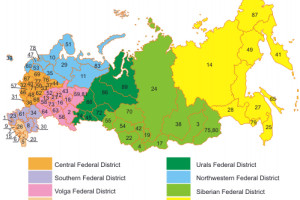Corruption, No Confidence, Poor Communication: How Governors Behaving Badly Will Impact Russia’s Regional Elections (excerpt)

(PONARS Eurasia Policy Memo – Emily Ferrs – July 2020)
Emily Ferris is a Research Fellow, Russia and Eurasia, at the Royal United Services Institute (RUSI), United Kingdom.
[Full text: ponarseurasia.org/memo/corruption-no-confidence-poor-communication-how-governors-behaving-badly]
Russia’s regional administrations tend to be overlooked as a toothless part of the system, lacking any real responsibility or power. While Moscow has certainly curbed governors’ autonomy under President Vladimir Putin’s rule, several important events over the past few months, such as the COVID-19 pandemic and amendments to the constitution, have brought the importance of regional governors back to the fore. The recent detention of Sergei Furgal, governor of the Far Eastern region of Khabarovsk, on murder charges-immediately after his region failed to ensure desired support for the constitutional amendment-has also refocused public attention onto governors’ performances.
The way in which these regional governors choose to counter the virus, as well as ensuring voter turnout for the constitutional vote, will likely provide an opportunity for governors flagging in the polls to improve their performance ratings. But governors responsible for political scandals, who struggle to stimulate the local economy, and fail to take responsibility for their own actions, might find themselves in trouble in the coming months. This memo unpacks some of the more recent governor scandals in further-flung regions such as the Arctic and Far East, to determine what this might mean for regional stability ahead of the imminent regional elections in September 2020, as well as the State Duma elections scheduled for 2021.
Some governors might be able to redeem previously poor performances by guaranteeing strong public support for Putin during election processes, while those with strong track records may be dismissed if they are unable to do so. Governors’ handling of the pandemic is also likely to be used as an excuse to oust unpopular officials ahead of the upcoming elections. As governors try to distance themselves from an increasingly toxic United Russia party in these elections, many governors are likely to run as ‘independent’ candidates, but are unlikely to be permitted any real autonomy. …
* * *
Conclusion
This, alongside some of the constitutional amendments that could see governors having greater autonomy over domestic and foreign policies, will make it more pressing for Moscow to ensure that UR-loyal governors enter office in the coming months. Without intervention from Moscow, there is a risk that non-partisan contenders could break up some of United Russia’s base in certain regions, cost it more public confidence, and weaken its control over regional administrations.
Ultimately, the most important benchmark of governors’ loyalty is the extent to which they can guarantee public support for President Putin. Even if some governors are allowed a longer leash to run political campaigns as independents, it is unlikely that their fundamental policies will be permitted to diverge from the UR party line. Many of the political changes taking place may appear to offer autonomy to governors, but in reality, it is always with the ultimate goal of serving the federal center.
[featured image is file image from earlier year]
Full text of article appeared at ponarseurasia.org/memo/corruption-no-confidence-poor-communication-how-governors-behaving-badly bearing the following notice:
PONARS Eurasia © 2019 All rights reserved
with the text “Permissions & Citation Guidelines” linking to ponarseurasia.org/permissions-citation-guidelines, which, in turns, bears the notice:
Permission:
Content by PONARS Eurasia may be re-distributed for Fair Use (non-commercial) purposes with credit provided to PONARS Eurasia and the author(s) and with a hyperlink/URL pointing to the original content page on this website.
